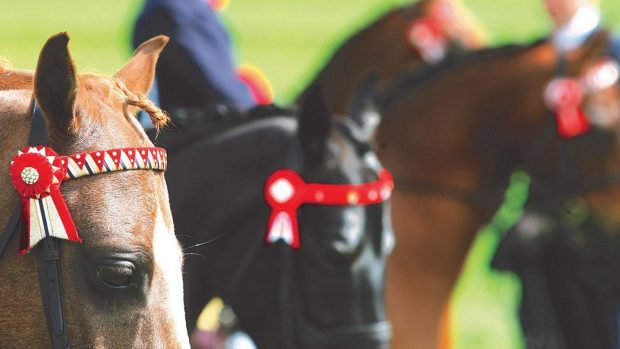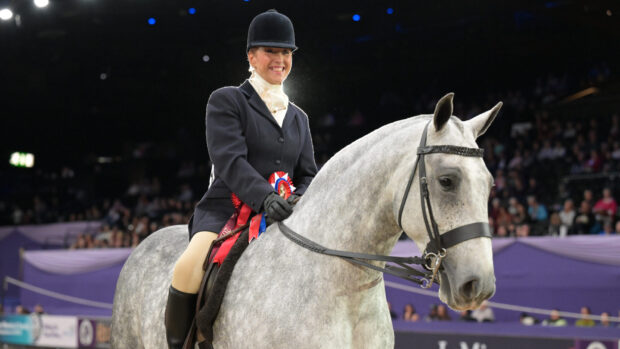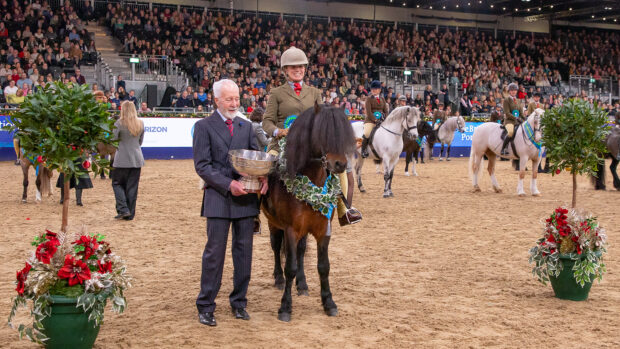Rolex Grand Slam of eventing winner Pippa Funnell shared her expertise with a packed crowd around the Vestey Viewing Arena at the London Horse Show today (19 December).
Here are a few insights from Pippa…
1. Be aware of the weather conditions when working with horses.
Especially in winter, make sure you stay stafe.
2. Rider position is important.
Pippa said: “Imagine you have a rope attached to your head pulling you up tall, a string attached to your heel pulling your leg down. Then pull your tummy button towards your spine, drop your shoulders, pull your shoulders back. Grow tall, but stay relaxed within it.”
3. You can use buckets or other everyday objects as part of your schooling.
Pippa asked the riders in the masterclass to weave between decorative lights as a suppling exercise – while keeping their own posture – but said riders could use something like buckets to do this at home.
“Don’t pull on the reins to turn and still ride with activity,” she advised.
4. Allow the bend.
“Often we give mixed messages,” she said. “If we want to bend left, we’ve got to allow the horse [to expand their body] on the right side.”
5. Don’t under-estimate how useful poles on the ground can be.
“We do so much over trot poles, working on rhythm,” she said. “We have to think about our balance too as riders and stay looking up. Also, we don’t want the horses to get bored, we want to vary the work we do with them.”
6. Mark yourself.
After a transition, ask yourself what mark you would get and then try to improve.
“It’s not about force, it’s just about repetition – repeat, repeat, until you get to a place where you think, ‘This is better, I’m happy with this’.”
7. Use the outside rein.
“People go wrong by slowing the horse using the inside rein, then the horse takes too much bend and loses balance,” she said.
8. The neck is the fifth leg.
“Horses have to be able to use their eyes to focus and use the length of the neck to balance,” she said.
9. You can jump small fences out of trot – or even walk.
“Out of walk, you don’t know what the horses are going to do, so it’s a good replica for cross-country riding,” she said.
10. Work on rideability.
Don’t be afraid to circle to improve bend in the middle of an exercise or halt after a fence if the horse is getting strong.
“We can all use transitions more – if the horse is going quick, make him think you’re going to stop. It’s all about mind games,” she said, urging the riders to make quiet, nice transitions as if they were in a dressage test, using the core and the leg to ask the horse to bring the hindleg under him and ensure he stays balanced.
“It’s important they learn the go and they learn the whoa. Set yourself little goals such as doing [the transition] a half a stride earlier than last time after a fence.”
11. Don’t obsess over strides.
“It you’re in good rhythm and balance, the horse can work out their own strides. Sometimes we need to forget it and just think about balance, straightness and the rhythm of the canter. Those are the golden rules.”
12. Let the horse learn.
“If the horse makes a mistake, don’t do anything different to the fence the next time – give them a chance to work out their footwork,” she said.
13. It’s all about partnership.
“It’s key to everything we do to build up our partnership and relationship, that our horses are happy and relaxed,” said Pippa Funnell as she concluded her London Horse Show demo. “I want my horses to be my best friends and they get confidence from repetition and trusting us as riders and people.”
You might also be interested in:

The perfect (human) body for dressage, camels and more: eight insights from Carl Hester

Killer instinct, Valegro’s nephew and riding all night – Lottie Fry and Anne van Olst’s demo at London

‘He could jump a bus’ – borrowed horse clears 1.90m for British rider in London six bar

‘His mane comes down to his knees’: meet the flying Friesian who caught everyone’s eye at London International Horse Show

Subscribe to Horse & Hound magazine today – and enjoy unlimited website access all year round
Keep up to date with all of the action from London International, including breaking news and behind the scenes insight from each day of the show, with no limit on how much you can read, from as little as £1 per week with a Horse & Hound unlimited website subscription. Join now




